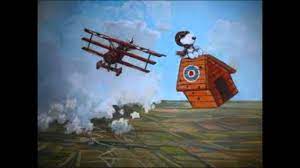 Each year one of my favourite Christmas songs is an old novelty song called Snoopy’s Christmas, released in 1967 by the Royal Guardsmen as a follow-up to their previous hit Snoopy vs. the Red Baron. (Those who are too young to have heard it or oldsters like me who enjoy a stroll down memory lane may find the song here.)
Each year one of my favourite Christmas songs is an old novelty song called Snoopy’s Christmas, released in 1967 by the Royal Guardsmen as a follow-up to their previous hit Snoopy vs. the Red Baron. (Those who are too young to have heard it or oldsters like me who enjoy a stroll down memory lane may find the song here.)
The song was inspired by actual events. During the First World War troops on either side of the front line crossed over into No Man’s Land on Christmas Day to celebrate the holiday together. Soldiers who were previously trying to kill each other on December 24 stopped trying to do that and met together to talk, share cigarettes, show each other photos of their wives, sweethearts, and families, drink together, and even play a game of football. It was initiated entirely by the soldiers themselves (beginning with the Germans). The military leadership was utterly opposed to the whole thing, and was emphatically not amused. Like Christmas, the astonishing and undeclared truce lasted one day.
The Royal Guardsmen’s song commemorating the event was as follows:
“The news had come out in the First World War:
The bloody Red Baron was flying once more.
The Allied command ignored all of its men,
And called on Snoopy to do it again.
T’was the night before Christmas, 40 below,
When Snoopy went up in search of his foe.
He spied the Red Baron; fiercely they fought;
With ice on his wings Snoopy knew he was caught.
(Refrain) Christmas bells those Christmas bells
Ring out from the land!
Asking peace of all the world,
And good will to man!
The Baron had Snoopy dead in his sights.
He reached for the trigger to pull it up tight.
Why he didn’t shoot, well, we’ll never know,
Or was it the bells from the village below?
The Baron made Snoopy fly to the Rhine,
And forced him to land behind the enemy lines.
Snoopy was certain that this was the end,
When the Baron cried out, “Merry Christmas, my friend!”
The Baron then offered a holiday toast,
And Snoopy, our hero, saluted his host.
And then with a roar they were both on their way,
Each knowing they’d meet on some other day.”
I can’t help comparing it to another seasonal song, John Lennon’s Imagine, released four years later in 1971. It also was an anti-war song, but came from a very different place. In Lennon’s imaginary world (excuse the pun), wars could be eliminated by eliminating religion: “Imagine there’s no countries;
It isn’t hard to do. Nothing to kill or die for, and no religion too. Imagine all the people living life in peace.” The idea seemed to be that war could be eliminated by eliminating religion and national borders. That was consistent with the billboards Lennon and his muse Yoko Ono sponsored, saying, “War is Over—If You Want It”. The scenario of evil men not wanting it seems not to have entered his brain.
Of course that’s just the problem—there are evil men who don’t want war to be over. Hitler was one of them. In theological terms, mankind is fallen (or, as the Lord put it, men were evil; see Matthew 7:11). The only thing that could possibly eliminate war is a change in the human heart, the operation where our stony heart is removed and replaced with a heart of flesh (see Ezekiel 36:26). In other words, war can only be eliminated by the change in men that comes only through Jesus Christ. It is tempting to conclude by saying that this was the true message of Snoopy’s Christmas—that Christianity is the answer to war and to all of mankind’s problems.
But the issue is not quite so simple. For one thing, it is fatally easy to apply a thin varnish of Christianity over the human heart and to imagine that this thin veneer is all that is needed. It is not so. Byzantium fought wars, for all of their love of icons, and the Generals of the First World War who were opposed to that brief and blessed Christmas truce were Christians too.
We can even see this in the song Snoopy’s Christmas itself. The endearing truce between Snoopy and the Red Baron warms the heart. But take a closer look at the last lines of the song: “And then with a roar they were both on their way, each knowing they’d meet on some other day.” That is, on Boxing Day or later, they would both mount up into the sky once more and try to kill each other all over again.
Christmas Day is wonderful, and culturally speaking, it is the time when the Kingdom of God intersects with this world. For those alive to this intersection, it is indeed unthinkable that one could kill a man on Christmas and then go home to celebrate the birth of Christ with one’s family by the family Christmas tree. But the cultural intersection ends soon enough.
What does this mean? It means that though individuals might allow Christ to transform them, to take out their heart of stone and replace it with a heart of flesh, cultures mostly resist this operation. They may allow a thin veneer of Christianity to be slopped on top, but that’s about it. Or, in the aphorism of G. K. Chesterton, Christianity has not been tried and found wanting. It has been found difficult and left untried. That explains both the wars of Byzantium and the chagrin of the World War One Generals.
It also means something darker and more difficult: that individuals allowing Christ to transform them will usually always find themselves in hot water. I am currently reading a book about the Nazi Lebensborn programme, a racially-inspired initiative which involved the abduction and “Germanization” of young children. In this book the author tells a story of many atrocities, such as the widespread and repeated rape of German women by the invading soldiers, especially of those of the Red Army. In one instance, a Red Army officer intervened and prevented the gang rape of some young girls by the men under his command. For this action, he was sentenced to ten years hard labour for the crime of “bourgeois humanism”. His heart might have been of flesh (or at least his moral compass was partially functioning), but the hearts of those above him running the system were still as stony as ever.
Depend upon it: virtue in this age is always martyric, and a price will be paid for consistent Christianity by those determined to live their lives within that blessed intersection of the Christmas Kingdom and this world. Christmas offers challenge as well as solace. And that (as Linus might say) is the true meaning of Christmas, Charlie Brown.

















